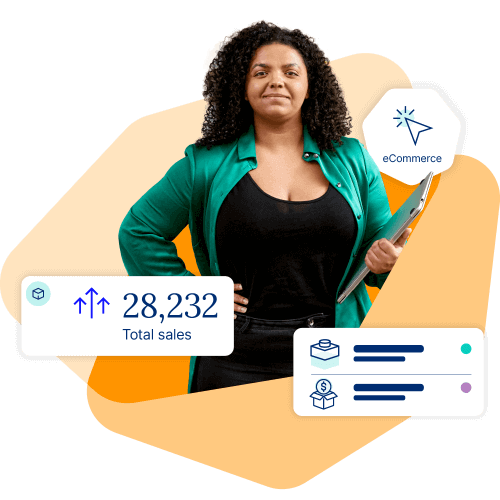
Learn the top five ways product companies and ecommerce specialists can automate their inventory and financials with Catching Clouds: An Acuity Company.
The Top Five Key Lessons for Automating Your Inventory and Financials:
Not many people start a business because they dream of doing accounting.
But Acuity is an exception — and it exists because most business owners don’t just want to avoid accounting: they’re also pretty bad at it. Acuity, on the other hand, is really good.
Acuity is a specialist provider of outsourced cloud accounting services to eCommerce businesses in the United States. They work with businesses that are selling on Amazon, Ebay, Shopify, BigCommerce, Commerce House, Wayfair, Magento, and many more platforms.
In addition, Acuity has worked with QuickBooks Online and Xero for years. For a while, their eCommerce practice only worked with Xero, but it is now also adding QBO to the mix.
Scott Scharf is chief technology officer and eCommerce practice lead for Acuity. He co-founded his accounting practice Catching Clouds with his wife Patti Scharf, before merging with Acuity in 2021.
“The thing about what we do is, we’re really consistent,” says Scott. “We provide the daily, weekly, and monthly bookkeeping, accounting and controller-level work for eCommerce sellers.”
Acuity says increasing the level of automation in your company isn’t about having fewer employees. It’s about giving yourself, and your employees, something better to do.
“When we automate accounting, we’re not doing it to remove the person — employee, spouse, whoever — was doing the bookkeeping,” Scott says. “The idea is that you’ve got a trusted person, so put them in a more trusted position.”
The same logic applies to product companies and 3PLs “Having a 3PL means your people can have higher-level tasks. You want those people who might otherwise be in your warehouse managing stock through a cloud inventory tool, negotiating purchasing, expanding your supply chain,” Scott adds. “They’re good employees. They care. You want them at a higher level.”
There will always be manual processes that need doing, and that software will struggle to automate, Scott says. What’s more, the supply chain crisis has changed the game. Where it might have once made sense to have your own warehouse, for many product sellers, it’s simply not worth it. Instead, smart sellers will automate what humans cannot do well, leaving them free to excel in other areas of the business.
“Don’t make smart humans do data entry. Let smart humans do smart human things, and make decisions based on data,” Scott says. “The more you leverage technology and people in the right places, at higher-level positions, the more profitable you’re going to be.”
The first app that Scott recommends for product sellers is, of course, online inventory management. Depending on the company’s ambitions and requirements, he recommends:
“I recommend that every product seller, of any size, implement cloud inventory solutions,” Scott says.
Connecting cloud inventory software to other best-of-breed software — like Shopify for eCommerce selling, ShipBob for third-party logistics, or ShipStation for shipping — lets you set and meet customer expectations in the same way a brand like Amazon does. It means a small brand can have the same capabilities as the biggest eCommerce companies in the world, with the added benefit of the personalized service that only smaller companies can truly provide.
“Amazon has set the expectation that customers can get their package in one to three days,” Scott says. “Now everyone can live up to that new standard.”
Getting the accounting right is vital to any product business’ success. Without good numbers, a business can’t know if it’s profitable. That’s where Scott and his team come in. Acuity makes it possible for smaller businesses to have the same accounting clout as a big player. The solution is simple: they take accounting right out of their clients hands.
“I’ve talked to a couple thousand sellers in the last 10 years, and none of them went into business to do accounting or bookkeeping, or to pay bills, sales tax, or income tax,” Scott says. “They’ve got a bigger ‘why.’ And that’s why financials are one of the first things they look at outsourcing.”
Once Acuity takes over the accounting, things get done properly by a team of experts who know how to navigate the byzantine pathways of international eCommerce selling and U.S. tax compliance requirements. To do this, their outsourced eCommerce offering has a team of specialist CPAs, along with a managed services team who can take care of the technical side.
“We’re able to support clients at all kinds of levels, but the main thing is always the same — we take over the financials, move them into the cloud, and we do it right. We update the chart of accounts, reconcile everything correctly, post income properly, post COGS properly per channel, and make sure everything flows together,” Scott says.
According to Scott, modern eCommerce accounting is as much about getting technology right as it is about compliance, reports, and projections.
“Having an accounting advisor that can translate, provide insight and accurate cash flow projections helps a business manage cash better and be more successful,” Scott says.
But without the right approach to tech, business leaders can find themselves lost in a confusing world of half-implemented, half-working apps.
“What some people do, when they don’t understand tech, is they just load an app and then another app and then another app. None of them connect, and all of a sudden they now have to enter data in three apps to accomplish something instead of putting it together,” Scott says.
This can put business owners right off implementing a modern software stack, but nothing could be worse. All they need to get it right is a good advisor.
“If you’re running an eCommerce business, you want an eCommerce accountant that already understands the space and has worked with dozens, if not hundreds of eCommerce companies. You have to go to the right people for the right tech advice — and then you want to leverage it, so you can expand and enhance and build automations so everything flows well,” Scott says.
Acuity is an outsourced cloud accounting service provider, specializing in eCommerce. They offer accounting with Xero and QuickBooks Online, and support Cin7, and leading eCommerce, 3PL, and shipping solutions
Experts experienced with Cin7 Core are an essential part of the Cin7 inventory management community. No matter what kind of product business you’re running, where you’re located, or what you’re trying to achieve, there’s a Expert on Cin7 Core who can help you achieve your ambition while saving your money and time.


A chain reaction of improvements Since their Cin7 implementation, Brompton’s US business has gone from strength to strength. The first and most important ingredient in their transformation: their inventory management is now tip-top. Phil cites a laundry list of improvements, including the ability to ring-fence stock for certain channels, preventing mis-ships. “Another work around we […]

If you’ve been hanging around the accounting department, chances are you’ve heard the term cost of goods sold (COGS) thrown around a few times. But while COGS is important, it’s also a concept people tend to misunderstand. Knowing what COGS is will help you better understand all of the costs associated with your product and […]

A lot of hype happens when ‘budget season’ comes around for a business, with images of late nights and spreadsheets and stress levels boiling over. For accountants, it’s just another normal financial budgeting task with monthly updates including actual results and changes to the forecast. How budgeting works Businesses generally set a budget for […]